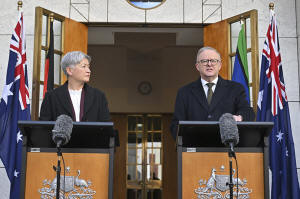Australia will recognize a Palestinian state, Prime Minister Albanese
says
[August 11, 2025]
By CHARLOTTE GRAHAM-McLAY
WELLINGTON, New Zealand (AP) — Australia will recognize a Palestinian
state, Prime Minister Anthony Albanese said Monday, joining the leaders
of France, Britain and Canada in signaling they would do so.
His remarks followed weeks of urging from within his Cabinet and from
many in Australia to recognize a Palestinian state and amid growing
criticism from officials in his government over suffering in Gaza, which
Albanese on Monday referred to as a “humanitarian catastrophe.”
Australia’s government has also criticized plans announced in recent
days by Israeli leader Benjamin Netanyahu for a sweeping new military
offensive in Gaza.
Albanese says conditions must be met for Palestine recognition
Albanese told reporters after a Cabinet meeting Monday that Australia’s
decision to recognize a Palestinian state will be formalized at the
United Nations General Assembly in September. The acknowledgement was
“predicated on commitments Australia has received from the Palestinian
Authority,” Albanese said.
Those commitments included no role for Hamas in a Palestinian
government, demilitarization of Gaza and the holding of elections, he
said.
“A two-state solution is humanity’s best hope to break the cycle of
violence in the Middle East and to bring an end to the conflict,
suffering and starvation in Gaza,” Albanese said.
“The situation in Gaza has gone beyond the world's worst fears,” he
said. “The Israeli government continues to defy international law and
deny sufficient aid, food and water to desperate people, including
children.”

Netanyahu rebuked Australia before the announcement
Ahead of Albanese’s announcement, Netanyahu on Sunday criticized
Australia and other European countries that have moved to recognize a
Palestinian state.
“To have European countries and Australia march into that rabbit hole
... this canard, is disappointing and I think it’s actually shameful,”
the Israeli leader said.
Australia has designated Hamas a terrorist entity and Albanese repeated
Monday his government’s calls for the group to return Israeli hostages
held since Oct. 7, 2023.
The Australian leader last week spoke to Palestinian President Mahmoud
Abbas, whose authority administers parts of the occupied West Bank,
supports a two-state solution and cooperates with Israel on security
matters. Abbas has agreed to conditions with Western leaders, including
Albanese, as they prepared to recognize a Palestinian state.
“This is an opportunity to deliver self-determination for the people of
Palestine in a way that isolates Hamas, disarms it and drives it out of
the region once and for all,” Albanese said. He added that Hamas did not
support a two-state solution.
Recognition is growing, but is largely symbolic without the U.S.
Nearly 150 of the 193 members of the United Nations have already
recognized Palestinian statehood, most of them decades ago. The United
States and other Western powers have held off, saying Palestinian
statehood should be part of a final agreement resolving the decades-old
Middle East conflict.
[to top of second column]
|

Australian Prime Minister Anthony Albanese, right, and Foreign
Minister Penny Wong address a press conference at Parliament House
in Canberra, Australia, Monday, Aug. 11, 2025. (Mick Tsikas/AAP
Image via AP)

Recognition announcements are largely symbolic and are rejected by
Israel, and by the United States — the only country with any real
leverage over Netanyahu. Israel's leader said this month that he
would not accept Palestinian Authority involvement in a government
for Palestine.
A two-state solution would see a state of Palestine created
alongside Israel in most or all of the occupied West Bank, the
war-ravaged Gaza Strip and annexed east Jerusalem, territories
Israel seized in the 1967 Mideast war that the Palestinians want for
their state.
Albanese dismissed suggestions Monday that the move was solely
symbolic.
“This is a practical contribution towards building momentum,” he
said. “This is not Australia acting alone.”
Albanese had discussed Australia's decision with the leaders of
Britain, France, New Zealand and Japan, he said. He also had a “long
discussion" with Netanyahu this month, he added.
In neighboring New Zealand, Foreign Minister Winston Peters said
Monday his government “will carefully weigh up its position” on
recognizing a Palestinian state before making a formal decision in
September.
“New Zealand has been clear for some time that our recognition of a
Palestinian state is a matter of when, not if,” Peters said in a
statement.
Australian Jewish and Palestinian groups criticized the move
After Albanese's announcement Monday, Israel's envoy to Australia
said the move undermined Israel's security.
“By recognising a Palestinian state now, Australia elevates the
position of Hamas, a group it acknowledges as a terrorist
organisation,” Amir Maimon posted to X.
“This commitment removes any incentive or diplomatic pressure for
the Palestinians to do the things that have always stood in the way
of ending the conflict,” spokesperson for the Executive Council of
the Australian Jewry Alex Ryvchin said in a statement.
Meanwhile, President of the Australia Palestine Advocacy Network
Nasser Mashni decried Albanese’s recognition as too late and
“completely meaningless” while the country continues to trade with
Israel.
He told reporters in Melbourne on Monday that the move would do
nothing to end the “ongoing genocide in Gaza which has been live
streamed for the entire world for two years.”
All contents © copyright 2025 Associated Press. All rights reserved
 |